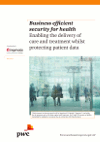 Healthcare providers are totally reliant on electronic systems for the processing of patient data. Patient records contain some of the most sensitive and private information about individuals that is imaginable. Without appropriate PETs and SETs in place, there is an obvious risk that patient data will be accessed and used unlawfully.
Healthcare providers are totally reliant on electronic systems for the processing of patient data. Patient records contain some of the most sensitive and private information about individuals that is imaginable. Without appropriate PETs and SETs in place, there is an obvious risk that patient data will be accessed and used unlawfully.
The privacy and security of patient data is now subject to heightened public interest and regulatory attention, following many high profile cases of privacy and security breaches.
The law now has a very low tolerance for lapses of privacy and security in the healthcare sector. This is evidenced in the enforcement action taken by regulators and in court judgements across Europe. Failure to comply with the law can lead to very serious legal consequences, including criminal prosecutions, penalties and sanctions, and significant operational challenges, such as business disruption, financial loss and damage to brand and reputation. In the last 3 years, the Spanish data protection authority has issued fines of over €40 million and the UK data protection regulator has issued fines of over £5 million for breaches of data protection law. These figures will be significantly higher when the proposed mega fines in the draft EU Data Protection Regulation are approved.
Download from eHealthNews.eu: Business Efficient Security for Health (.pdf, 4.251 KB).
About Imprivata
Imprivata is a leading provider of authentication and access management solutions for the healthcare industry. Imprivata's single sign-on, authentication management and secure communications solutions enable fast, secure and more efficient access to healthcare information technology systems to address multiple security challenges and improve provider productivity for better focus on patient care.